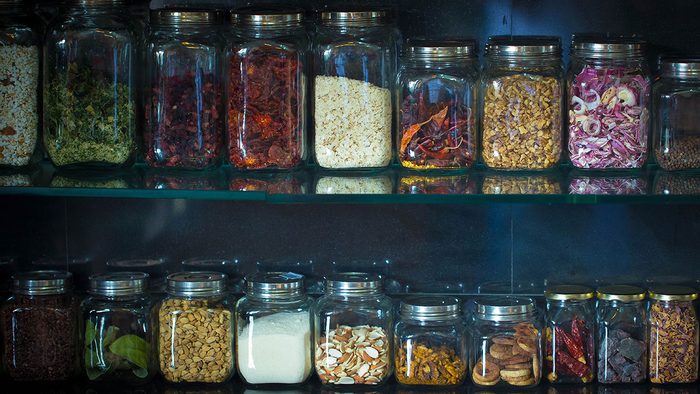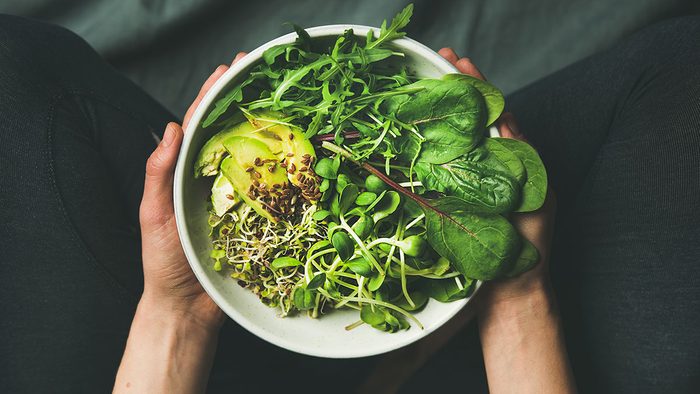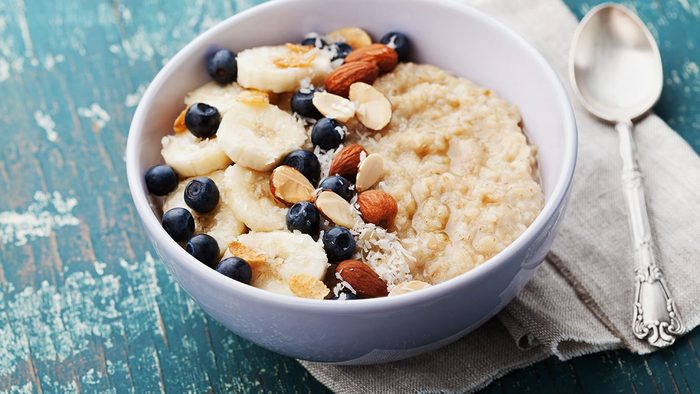
Mini health resolutions – why thinking small works
Instead of declaring a sweeping number of health resolutions that—let’s be honest, you’ll probably forget about in February—making micro monthly goals can be more effective. “Attempting to improve your health is much easier when you take small steps towards wellness, one step at a time, one bite at a time,” explains Patricia Greenberg, a health and nutrition expert and author. “Jumping in too quickly often results in disappointing progress or, worse, an injury because you are hoping for a quick fix or an unattainable goal.” (It could also be your perfectionism that’s sabotaging your resolutions.)
To make a true commitment to your health and transform your lifestyle in a long-term, meaningful way, try manageable tweaks. “Starting today, set small, easy-to-complete goals for yourself, and you’ll see over time how you can add a little more each day to get to where you want to be. Eventually these will become your habit,” she explains.
Here is your month-by-month guide to better health in the New Year. (Also, here are no-fail tips for achieving your resolutions.)

January health resolutions: Makeover your pantry
You made it to the gym after a stressful planning meeting at work and you somehow managed to drink four full glasses of water throughout the day. You’re on the right track, but then it’s suddenly 10 p.m. and you’re staring down that box of Girl Scout cookies in your cabinet, wondering if one bite will make that much of a difference. The solution: A top-to-bottom pantry makeover so you never get in that position in the first place. “The physical action of changing over a pantry is very satisfying, and it’s step one when thinking of small achievable goals,” says Maya Feller, RD.
Swap out those processed salty and sugary foods for minimally processed whole foods (Hello, raw nuts, quinoa, and dried fruit!). If you do want to keep an indulgent treat or two, place it on a high shelf that you don’t use regularly, so it’s not the first thing you see when you open the cupboard in search of something to eat. “We know when smart food choices are accessible and convenient, people are more likely to make healthful balanced meals.”
Not sure where to start? Here are the healthy pantry essentials that should always be in your kitchen.

February health resolutions: Get your heart racing
Celebrate Heart Health Month by focusing on cardio, suggests Joseph Young, MD, hypertension lead and researcher at Kaiser Permanente. Because this essential organ is paramount to your vitality and longevity, keeping it in tip-top shape will improve your energy levels and help build endurance. “It’s as simple as walking outdoors or indoors at a shopping mall,” he says. “Regular, moderate physical activity, or walking 30 minutes a day, five times a week, helps lower blood pressure because exercise helps the heart work more efficiently. Pick something you enjoy and make it a habit.” Looking to tone your entire bod? Here are the best strength training exercises to try.

March health resolutions: Focus on your eyesight
Most of us don’t think much about our eyesight until there’s a problem with it. “The thought of losing your eyesight is horrible, however, most don’t even do the most basic things to protect it,” shares Vivienne Hau, MD. Protecting your peepers is as simple wearing sunglasses with UVA/UVB protection or wearing a wide-brimmed hat. “The sun’s harsh rays can damage your eyes causing inflammation, cataracts, tumors, and even cancer,” she explains. (For better eyesight, try these foods.)

April health resolutions: Eat more fruits and veggies
Now that you’ve had a full three months to settle into the year, it’s time to have a reality check with yourself: Are you still on the bandwagon? Hanging on by a pinky? Or are you waving, miles away, admitting defeat? It’s OK if you had a slip up, but now it’s time to re-center your attention on your diet.
A simple way to jump-start your springtime health goals is to increase your daily and weekly servings of non-starchy vegetables and fresh fruits, shares Feller. These types of fruits and vegetables provide fibre, vitamins, minerals, and phytochemicals, and when you consume five servings, you’re doing a solid for your digestive system. Start with these fruits and veggies that will help prevent high cholesterol.

May health resolutions: Try Meatless Mondays
Lean animal proteins can be great for you, but only if your diet is balanced with the right amount of fruits and veggies that provide the additional nutrients and fibres your body craves and needs. To help you figure out if you’re eating enough—or too much—protein (here are the signs you’re eating too much protein) on a regular basis, go meatless for the five Mondays in May. “Research has shown that the average American does not meet the recommended intake for fruit and vegetables consumption,” Feller says. “Even one meatless day per week can help you get to the recommended intake and reap all the benefits that plants have to offer. And hey, it will be a boost for the environment,” she says. Check out our 7-day vegan meal plan to inspire you.

June health resolutions: Eat more home-cooked meals
Between work, kids, and trying to squeeze in a few minutes for yourself, taking time to prep a healthy meal can feel like a chore. But it’s so worth it to invest that elbow grease. People tend to eat healthier at home (and no, takeout doesn’t count) since foods prepared at restaurants or fast food joints tend to have more calories, total fat, salt, and sugar, Feller says.
To make it less hassle on those days you’re already overworked, she suggests making a list of five to seven lunches and breakfasts that you can make without thought. These can be your go-to meals that save you inches on your waistline—and dollars in your wallet. Follow these make-ahead meals, which will save you time (and save you from consuming unnecessary unhealthy fats and sugars).

July health resolutions: Create a healthier relationship with food
Many people struggle with an inaccurate perception of what it means to eat smarter and clean, while in reality, mindfulness consumption isn’t black and white, good or bad, Feller says. “This is less about having salad for lunch every day and more about creating a consistent pattern of eating that allows for life as well as supports health and reduced the risk of developing diet related chronic illness,” she says. Use the lazy, hot days of summer to identify your feelings toward food and also address any lingering questions you have about what might be wrong with your diet or investigate certain food group you’re sensitive to. When you’re clearer about what works for you, the more success you’ll have.

August health resolutions: Make your doctor appointments
“Many people take some time off in August so your boss probably won’t mind if you’re out of the office for a few hours,” suggests Tania Dempsey, MD. Summer is a good time to schedule your physical and health maintenance screening exams including colonoscopies, pap smears, and mammograms. (Before you go, make sure you know the things you should never lie to your doctor about.)

September health resolutions: Reimagine grains
September is Whole Grains Month, so what better time to experiment? “Make it your goal to make at least half of the grains you consume whole grains,” suggests Kaleigh McMordie, RD, and blogger behind Lively Table. “Whole grains are important sources of nutrients, can improve your digestion, help you feel full longer, and help you maintain a healthy weight.” For starters, swap white rice for brown, eat more oatmeal instead of sugary cereal, and switch your white bread to wheat, she suggests. You’ll be amazed at how your body functions smarter and easier when you’re specific about whole grains. (Also, consider this nutrient-packed seed that’s worthy of replacing your everyday grains.)

October health resolutions: Get a flu shot
It’s not the most dynamic goal of the year, but it is one of the easiest ways to boost your immune system as we head into flu season. October is the best time to get your flu shot, shares Michael Jackson, PhD, infectious disease researcher at Kaiser Permanente. “It’s good to get it early because the vaccine can take two weeks to be fully effective, and it lasts for about year so you are protected all season long,” he says. (Also, boost your immune system with these cold-fighting foods.)

November health resolutions: Spend a few minutes meditating
While mental health is an important reminder no matter the day, month, or year, Dr. Dempsey says working in just a few minutes of meditation time will maintain your mood and happiness levels in a meaningful way. “November marks the start of the holiday season, which is often very stressful for a lot of people,” she shares. Even a five-minute break to calm your mind and body will reduce your stress and help you get through the day. Here’s how meditation can change your brain.

December resolutions: Manage alcohol consumption
’Tis the season to drink every last drop of eggnog… or not. As Dr. Dempsey says, the temptation to go overboard with booze is plenty as you party hop from one celebration to another. “One or two drinks at a party might be fine but more can increase your risk of other health problems, including liver issues and weight gain,” she says. See what happens to your body when you binge.
